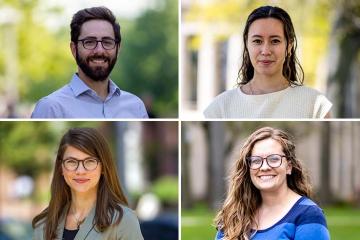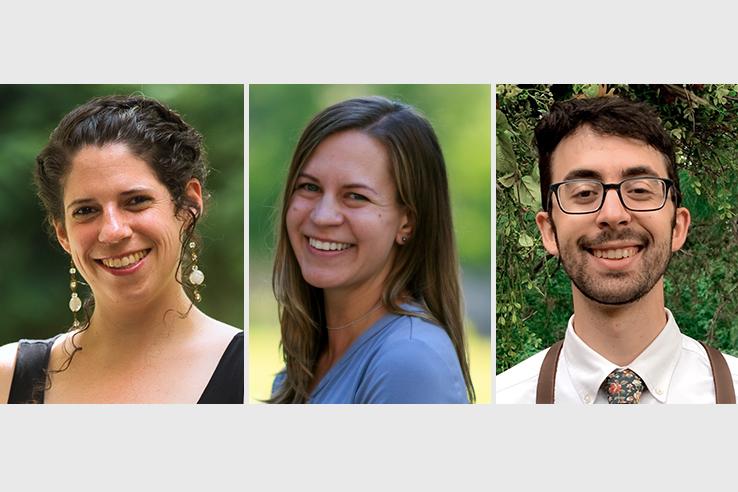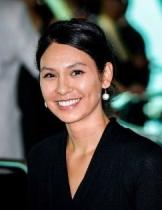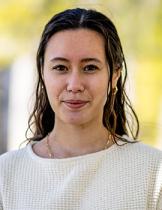
J-PAL North America Staff Spotlight: Communications & Fundraising Team

In the second post of a continuing Staff Spotlight series, we feature three members of the J-PAL North America communications and fundraising team. These staff members disseminate research results, promote the use of evidence to reduce policy, and encourage relationships with donors, policymakers, implementers, peer organizations, and researchers. Explore their varied professional and educational backgrounds and hear their thoughts on how rigorous research can inform policy.
Francesca Freeman
Francesca Freeman is a senior development associate at J-PAL North America where she coordinates and supports the implementation of a comprehensive development and fundraising strategy. Find out how Francesca’s research and policy background informs her work.
What drew you to J-PAL North America?
My past academic experiences were very qualitative, so I was excited to learn about quantitative research at J-PAL. I’m glad to support an infrastructure of creating evidence and using that evidence to inform policy. Along with that, I was excited about the opportunity to gain nonprofit management skills on the Finance and Operations team. I’m interested in nonprofit management and am in the process of founding a very small nonprofit, DAWNetwork, so I was eager to learn the ins and outs and strategies of fundraising.
What was your professional background before coming to this role?
I’ve pretty consistently worked at the nexus of education, development, and peace studies. My first job out of college was at the Social Science Research Council with Next Generation Social Sciences in Africa, a fellowship program for African PhD candidates studying topics related to peace, security, and development. That was my first experience with rigorous research. I also developed a deeper understanding of the importance of centering a decolonial perspective and promoting research from the Global South.
After I finished my master’s degree in Holocaust and Genocide Studies at University of Amsterdam, I worked in policy in DC. The policymaking process can be like throwing darts at the wall to see what sticks, and it’s not always clear that what “sticks” will have a positive impact. It was frustrating when policymakers and advocates lacked a rigorous understanding of the topics relevant to the policies they were making. I saw policies go through that were not effective or had unintended consequences. I think rigorous research can play a significant role in ensuring that policies have the intended impact.
What is your work-from-home space like?
I often work from my couch so I can look out my window. I’m known for my bright blue wall. In our “home office” there’s a whiteboard, where I write my big picture goals, and a print from a local artist. My workspace isn’t complete without my dog Buster, who is ever-present and, most of the time, barking.
If you could learn about a historical event firsthand, what would you choose?
There was a student movement in Nazi Germany called the White Rose; they were a non-violent resistance group that opposed the Nazi regime. At the time, there was little political resistance to Nazism within Germany and occupied territories—most resistance came from partisans and was often centered on militant approaches. Now, there’s so little talk about nonviolent political resistance. I’d be interested in going back and meeting the students and developing an understanding of their exceptional bravery and commitment.
Erin Graeber
Erin Graeber is a senior policy and communications manager at J-PAL North America, where she leads the team’s external communications strategy and oversees our energy, environment, and climate change work. Learn how her work in international development led her to J-PAL North America and her favorite parts of her current role.
Tell me a bit about your career before coming to this role.
The two continuing threads in my career have been a focus on social change and environmental sustainability. After starting out at a small nonprofit working to increase the sustainability of consumer products, I headed to grad school to study international development. Soon after I graduated, I worked abroad with an international nonprofit in Malawi and Botswana on programs ranging from disaster risk reduction to nutrition. I quickly learned how critical evaluation is to helping organizations better understand their impact, but that conducting rigorous evaluations is challenging and not always standard practice in nonprofits. When my family moved back to the United States, I decided to transition out of direct implementation and focus on how to support organizations in conducting rigorous evaluation.
In my current role, I look not only at how impact evaluations can be conducted effectively but also at how they can influence policy and programs on the ground. As the manager of our Energy, Environment, and Climate Change team, I also think a lot about how and where randomized evaluations can inform environmental policy and help communities hit hardest by the effects of climate change.
What are your favorite aspects of your role?
I love that I get the opportunity to help colleagues from across the organization share their work with a broader audience. It’s incredibly fulfilling to watch team members succeed in getting their messages across, whether through a video clip, a great op-ed, or a captivating webinar. I am also so inspired by our communications team. It’s exciting to have such committed, thoughtful colleagues who constantly find innovative ways to share the stories of our work and how we are making an impact. It’s incredibly rewarding as a manager to see my team champion new areas of work and execute ideas I never would have thought of myself.
What do you spend your time doing outside of work?
My son has always been fascinated by classical music. When he was just a year old, he was the only kid transfixed by a string quartet at an outdoor picnic. My father-in-law (who is immensely cooler than me) recently signed him up for cello lessons. It was a bit of a rocky road at first, as he’s only five, so I am now also learning to play the cello and practice with him every day. I never thought that I would be learning a musical instrument right now, but I really love it. I feel like it’s such a great life lesson–you can do anything with patience and practice.
Sam Haas
Sam Haas is a policy and communications associate at J-PAL North America, where he executes communications strategies and supports the Worker Prosperity Initiative. Discover what brought him to J-PAL and how he values his role here.
What is your professional and educational background? How does your role relate to your previous experiences?
I went to Northeastern University in Boston, where I studied Philosophy, Politics, and Economics. The core thing I gained was the belief that to change systems in the world, you have to be able to talk across disciplines and understand the fundamental assumptions and questions that others are grounded in.
I did an internship at J-PAL North America in my fourth year. It was my first real exposure to how economics can answer policy questions and impact real people, which shaped many of my career goals.
After graduating, I worked for an experiential entrepreneurship program at Northeastern. That role taught me a lot, but I had a growing desire to work in an organization whose mission aligned with more of my values. Supporting students in pursuing their goals was a bright spot in that role, but I wanted more. That’s how I ended up back at J-PAL
What do you like most about J-PAL North America?
The work culture at J-PAL is driven by the people. Everyone who works here is bought into our mission and our values. That extends to the way we do our work, which involves being kind, a lot of humor, and creating space for everybody to be themselves. J-PAL is also an environment where we’re able to take a lot of responsibility on projects that we’re interested in and run with them.
What valuable career lessons have you learned so far?
First of all, there are lots of opportunities for continuing learning, including taking classes at MIT (such as the Data, Economics, and Development Policy MicroMasters) to expand technical skills and knowledge.
Through working on our communications team, I’ve gained on-the-job exposure to different frameworks and concepts in strategic communications, much of which has been new to me.
Finally, J-PAL is also so consistently collaborative that I have learned a lot more about how to effectively work with others—and how to do that differently with different people and in different situations.
What kinds of hobbies and interests do you have outside of work?
I like to read. One of my favorite books is Braiding Sweetgrass by Dr. Robin Wall Kimmerer. I probably read it once every year now; it’s about her career as a botanist and how she has sought to blend Western “objective” scientific methods with indigenous ways of knowing.
I also love being outside, especially in the spring and summer. I bike, I play a lot of basketball and volleyball, I love a good park or beach day. When I can’t be outside, I like to play board games, especially collaborative ones (Hanabi and Mysterium are two favorites!).
This post is the second in a blog series highlighting staff at J-PAL North America. Other installments feature members of our health team and state and local team. To learn more about our staff and their accomplishments, follow J-PAL North America on LinkedIn.

